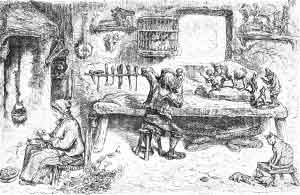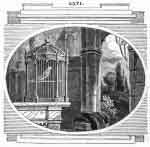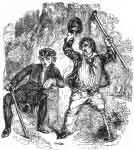A Nightingale rued being caged. He got free but then found that the outside world was a miserable place to one not raised there. Realization was his death.
It’s not always greener on the other side of the fence.

JBR Collection
A Nightingale which belonged to a person of quality, was fed every day with plenty of choice dainties, and kept in a stately cage. Yet, notwithstanding this happy condition, he was uneasy, and envied the condition of those birds who lived free in the woods, and hopped up and down, unconfined, from bough to bough. He earnestly longed to lead the same life, and secretly pined because his wishes were denied him. After some time, however, it happened that the door of his cage was left unfastened, and the long wished-for opportunity was given him of making his escape. Accordingly, out he flew, and conveyed himself among the shades of a neighbouring wood, where he thought to spend the remainder of his days in contentment. But, alas! poor bird, it was mistaken; a thousand inconveniences which he never dreamt of attended this elopement of his, and he was now really that miserable creature which before his imagination had only made him. The delicate food with which he used to be fed was no more; he was unskilled in the ways of providing for himself, and even ready to die with hunger. A storm of rain, thunder, and lightning filled all the air, and he had no place to screen or protect him; his feathers were wetted with the heavy shower, and he was almost blinded with the flashes of lightning. His tender nature could not withstand the severe shock; he even died under it. But just before he breathed his last, he is said to have made this reflection: “Ah, were I but in my cage again, I would never wander more.”
[Note: James Northcote’s collection has fables similar to others but with different endings. This is one of those, written as a poem, that is similar enough to include on this page. It can be summarized as: A Nightingale thrashed in a net and felt confined in a cage; despite food and drink. But she thought about all the ills of the forest and accepted fate.]

Northcote (The Nightingale)
How few, with patience can endure
The evils they themselves procure!
A Nightingale with snares beset,
At last was taken in a net:
When first she found her wings confin’d,
She beat and flutter’d in the wind,
Still thinking she could fly away,
Still hoping to regain the spray;
But finding there was no retreat,
Her little heart with anger beat;
Nor did it aught abate her rage,
To be transmitted to a cage;
The wire apartments, tho’ commodious,
To her appear’d excessive odious;
And tho’ it furnish’d drink and meat,
She car’d not, for she could not eat.
‘Twas not supplying her with food—
She lik’d it better in the wood:
And water, clear, her thirst to slake,
She chose to sip it from the lake:
And, when she sung herself to rest,
‘Twas in that grove she lik’d the best.
And thus, because she was not free,
Hating the chain of slavery,
She rather added link to link:
Just so men reach misfortune’s brink.
At length revolving on her state,
She cries, ‘I might have met worse fate,
‘Been seiz’d by Kites, or prowling Cat,
‘Or stifled in a school-boy’s hat;
‘Or been the first unlucky mark,
‘Sure hit by some fantastic spark.’
Then conscience told her, want of care
Had made her fall into a snare;
That men were free their nets to throw;
And birds were free to come and go:
And all the evils she lamented,
By caution might have been prevented.
So on her perch more pleased she stood,
And peck’d the kindly offer’d food;
Resolv’d, with patience, to endure
Ills she had brought, but could not cure.


